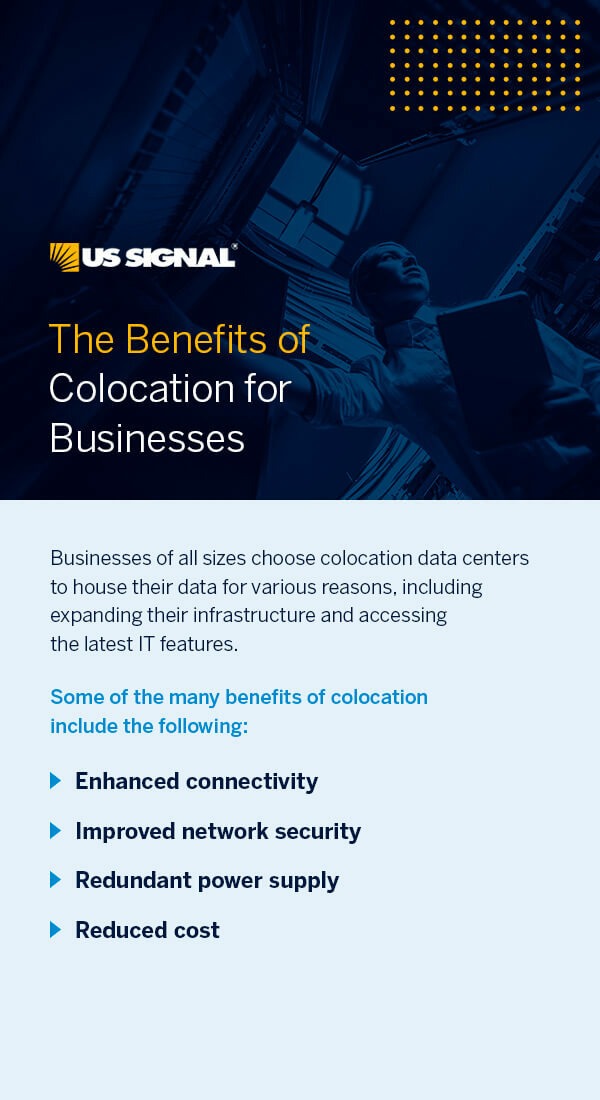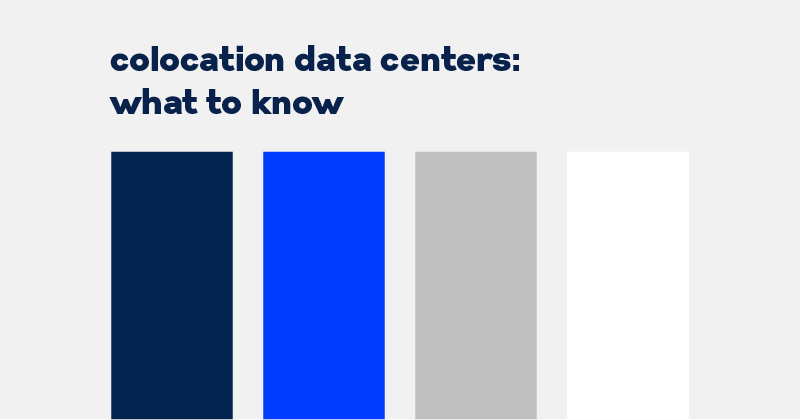How to Choose a Colocation Provider

Updated: August 3, 2023
Colocation is a powerful tool with considerable benefits for businesses. More companies choose colocation data centers every year. Deciding to explore colocation as an option for your business is one thing, but knowing how to choose a colocation provider is another matter. With so many providers out there, making the best decision for your business is essential.
Knowing what to look for in a colocation data center can make decision-making much more straightforward. With the following ideas, you can be confident in your choices and start reaping the benefits of colocation.
What Is a Colocation Provider?
A colocation data center is a cost-effective and flexible alternative to an in-house data center. A colocation data center offers a safe, physical location with a network, security, cooling and power to house your data. You can rent the space you need and trust your colocation service provider to keep your business online and secure.
Many colocation data centers offer auxiliary services, such as software tools and expertise, providing a complete platform for your business. Depending on your business needs, you could consider managed colocation services with providers that offer fully equipped data centers, eliminating the need to purchase your servers.
Why Is Choosing the Right Colocation Data Center Important?
Many businesses choose colocation as part of their overall IT strategies to keep up with ever-changing business and technology needs. While there are significant benefits to housing your data servers in an off-site facility, it’s best to consider all the variables carefully before choosing a provider.
Your colocation data center must be able to meet your business requirements, provide the service you agreed to and keep your data and expensive equipment safe. The right colocation data center can save you money, provide you with consistent network access and increase your cyber security profile.
The Benefits of Colocation for Businesses

Businesses of all sizes choose colocation data centers to house their data for various reasons, including expanding their infrastructure and accessing the latest IT features. Some of the many benefits of colocation include the following:
- Enhanced connectivity: Colocation data centers offer redundant network connections, ensuring your business applications continue to run without interruption.
- Improved network security: Data centers must comply with industry and regulatory security standards, and many offer the latest cybersecurity technology to prevent unauthorized access to your systems.
- Redundant power supply: Colocation data centers specialize in backup power, offering numerous backup systems to ensure your systems receive uninterrupted power.
- Reduced cost: Expanding your in-house data centers requires significant capital investment. Data centers allow you to expand and rent only the space you need.
What to Look for in a Colocation Data Center
Data is your most valuable asset, and you need to know your assets are in safe hands. Although you need to match your business needs with an appropriate provider, there are some essential elements your service provider should have as part of their package.
The following qualities are essential when considering how to choose a colocation provider. With a comprehensive view of what to look for in your colocation data center, you can make an informed decision for your business:
1. Colocation Facility Location
As you’ll be moving your servers off-site, considering travel time is necessary when choosing a colocation facility. Depending on your arrangement with the colocation provider, you may have to travel for maintenance and emergencies.
Suppose your principal place of business is in a disaster-prone area. In that case, you may opt for a colocation facility that meets the structural requirements to keep your critical infrastructure safe. Ask any potential service provider how the area’s climate, weather conditions, energy and communication affect the data center’s operation.
Some businesses strategically approach their data center location for security reasons. Hence, the proximity of your data center to your principal place of business, customers, partners and other stakeholders is up to you. You may explore colocation in more than one physical location , employing a multiple-data center strategy.
2. Physical Security Measures
Physical security is one of the most important considerations when choosing a colocation data center. Your physical equipment and data are critical to running your business. Having adequate protection prevents you from incurring the costs of lost or damaged servers and downtime due to lost data or connectivity.
Your colocation data center should have the following security features:
- Access control and surveillance: Access to colocation data centers should be limited by biometrics or other forms of authentication. Check whether there is camera surveillance at all entrances to the center and whether it is monitored at all hours.
- Redundancy and backup systems: Redundancy allows your business to operate in the event of a disaster, as the redundant systems take over from the main systems of a natural disaster, cyberattack or potentially dangerous human error occurs. With data redundancy in place, you can rest assured the data center is protecting your assets from power and temperature fluctuations and that your applications and data are still available.
- Compliance certifications: Colocation providers must comply with industry data center regulations. Ensure the colocation center you choose has the required certifications and complies with all applicable regulations. They should support third-party audits if needed.
3. Colocation Network Security
You need to know that your colocation provider can provide the same or better security than you would have if you used an in-house data center. Any provider you consider should employ cutting-edge security technology to minimize the chance of a data breach or cyber attack. They should be able to protect your data center and company operations from the damaging effects of cybercrime.
Some of the network security measures to bear in mind include the following:
- Network monitoring and management: Your colocation provider should have the latest security innovations in place to protect your data, such as firewalls and virtual private networks.
- Redundancy and backup systems: In a data breach, your colocation provider should have backup systems to ensure you still have access to your data, so your business can continue functioning.
- Compliance and certifications: Colocation providers must comply with cyber security regulations and be audited for compliance with regulatory requirements and industry standards. Request information on their certifications and a thorough breakdown of their compliance procedures.
4. Colocation Service Level Agreement
Service level agreements (SLAs) outline what type of service you can expect and allow you to hold your service provider responsible if they don’t meet your needs. Make it one of your top priorities to check any potential service providers’ service level agreements to check whether their services fit your business needs.
While you review the SLAs, ensure there’s no ambiguity in the terms and guarantees. Reach out to your potential provider and ask them for clarification — they should be happy to assist. There should be some room for negotiation on both sides and some flexibility built into your agreement so you can upscale if necessary.
In the event of service level failure, service providers often have remedies outlined in their SLAs, allowing you, as the customer, to receive a form of reimbursement for the loss of business that may occur as a result of the failure. Service credits and remedies vary depending on the service provider. Ensure your SLA clearly states the following:
- The method of calculating credits.
- Limitations on credits — most SLAs prevent you from pursuing a separate claim for breach of contract in the event of a failed service.
- Your right to terminate your contract for chronic failures.
- A clear outline of exceptions to the provider’s obligation to credit failures, such as customer errors.
5. Energy Usage and Cooling
As you can imagine, data centers use a great deal of energy, and managing their energy consumption is crucial to providing the best service for their customers. The lower a data center’s energy consumption, the more efficient the center, resulting in lower operating costs.
Energy efficiency is also an environmental consideration. Your potential provider should aim to lower their emissions in line with the 2021 UN IPPC report , citing that critical and drastic action is needed to mitigate our effect on climate change. Partnering with a green data center is the right thing to do and ensures your business takes the necessary steps to reduce your carbon footprint.
Data centers rely on adequate power and cooling to provide their customers with consistent high-bandwidth connectivity. The cooling systems in a data center should correspond with the power output, as incorrect cooling could damage equipment and cause eventual failure.
Your potential provider should also have a standby power supply so all systems receive uninterrupted power. Ascertain whether the area is prone to power outages, as complete power loss can significant business. Many data centers opt for engine generators that kick in immediately during a power outage.
6. Service Provider Reputation
Choosing a data center provider is like choosing a partner for your business. You need to know as much as possible about your potential providers, their service, and whether their other customers are satisfied with their performance.
Take the time you need to conduct detailed research on any providers you consider and include the following points:
- Provider background and history: Find out how your potential provider has performed in the past. Have they been able to provide a consistent service? Have they allowed other businesses flexibility and scalability? Learn who the key stakeholders are, how many data centers the provider has and what service levels they provide. It’s also important to establish whether they’re aligned with the latest security and connectivity innovations, as it shows they’ll continue evolving their services.
- Customer reviews and testimonials: What other people say about your potential provider is a powerful indication of the level of service you can expect. Look around for testimonials and feedback from current clients to get an idea about how they handle customer issues.
Any provider you consider should have exceptional reviews and a proven track record, so you can start your arrangement feeling confident in their abilities.
7. Network Connectivity and Carrier Neutrality
One of the fundamental reasons you’d choose a colocation service is to ensure you have stable and redundant network connectivity. Colocation is part of an overall IT strategy that relies on your provider’s ability to maintain connectivity with a wide range of options. Your business must be able to align with network providers that meet your specific needs, or you face the possibility of costly downtime and dissatisfied customers.
Your provider should ensure you can access the apps and resources your business needs through a wide range of network providers. Your data center should provide you with diverse carriers throughout its facilities and on-site support in the event of connectivity challenges. Ask how many cloud and network providers you can access and whether you can bring in your network carrier. You should be able to create a bespoke connectivity plan for your business.
Find out about your potential colocation provider’s disaster recovery plan, so you know how quickly you can expect your connectivity restored after a disaster, so you can rest assured you have business continuity.
8. Technical Support and Customer Service
When you choose a colocation data center, you want to have confidence in their abilities when facing challenges. Sending your own IT staff every time there’s a challenge is time-consuming and adds to your overall expenses. Your data center should offer in-house remote support, with engineers on-site to help with routine tasks such as reboots and network maintenance and lend a helping hand in emergencies.
Before you make your final decision, ask your potential provider what support options they offer and what their support availability looks like. Consider what level of technical support would suit your needs, and then see whether your chosen data center can provide it.
Communication is another critical consideration. Ask your potential provider about communication channels and what kind of response times you can expect in an emergency. Your ideal provider should offer 24/7/365 support, so you experience minimal downtime and optimal business continuity.
9. Flexibility and Scalability
Looking beyond your current needs is best when choosing the best fit for your business. Consider whether a provider can meet your goals now and support your future growth. Ask your potential provider whether they could accommodate more building space and power. Ideally, they should offer you ample space for growth with unique options suited to your needs.
Contact US Signal for Colocation Services
Choosing a colocation data center that fits your business well means evaluating many variables. US Signal can take you through the decision-making process step by step, starting with this handy colocation evaluation checklist .
Our colocation data centers can offer space, scalability, power, and state-of-the-art physical and network security. Our secure and compliant data centers ensure your assets are housed in certified facilities aligned with industry standards, with redundant fiber connections and 24/7/365 maintenance. Get started with US Signal today.



